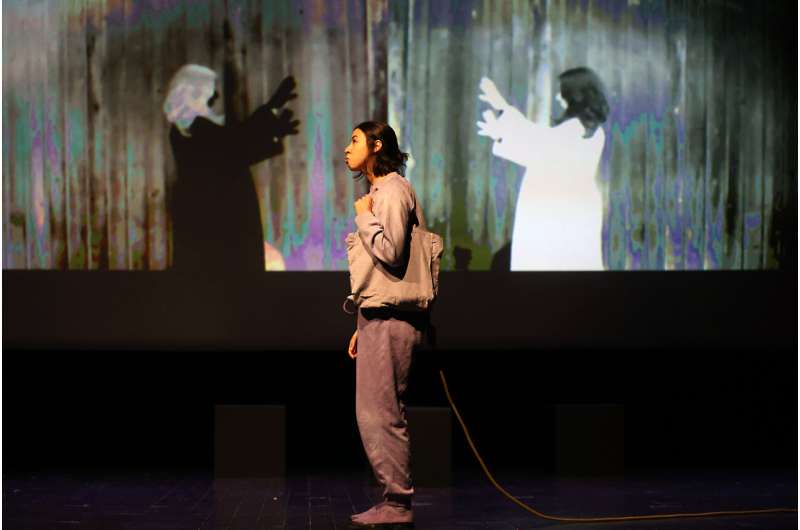Science
Theater Tackles Bipolar Disorder Stigma with Innovative Play

A Portuguese theater company is harnessing the power of performance to challenge stigma surrounding bipolar disorder. The play titled Oxímoro, entre Solstícios e Equinócios (Oxymoron, Between Solstices and Equinoxes) was developed by Marionet in collaboration with medical professionals, researchers, and patients, aiming to raise awareness and foster understanding of this complex mental health condition.
The production took place from March 20 to 24, 2024, at the BlackBox of Convento São Francisco in Coimbra, Portugal. The project sought to inform audiences about bipolar disorder while reducing the stigma often associated with it. A trailer promoting the play highlights the misconceptions surrounding mood swings, underscoring that bipolar disorder is a serious medical condition rather than a source for casual jokes.
The play’s creators engaged extensively with experts throughout the writing process. According to Mário Montenegro, a key figure at Marionet and the Center for Interdisciplinary Studies at the University of Coimbra, the collaboration with the Center for Neuroscience and Cell Biology was essential. This partnership ensured that the artistic representation was grounded in scientific research and real-life experiences.
Montenegro explained, “We felt the need to change our creative process, because these were delicate subjects that touched people’s lives. We realized we needed to be even better informed.” The writing of the script was informed by interviews with patients, healthcare providers, and family members, capturing their personal narratives and realities.
The play consists of various scenes featuring a range of characters and experiences rather than following a single narrative. This approach allows for a more nuanced exploration of the theme. Over the course of six performances, approximately 300 audience members attended, with 54 providing feedback through questionnaires designed to gauge their emotional engagement and understanding of the content.
The results of this audience analysis were shared in the Journal of Science Communication, where the authors noted that emotional engagement played a crucial role in helping viewers assimilate scientific information. The findings suggest that empathy and personal identification with the characters can contribute to a reduction in stigma surrounding mental illness.
Montenegro emphasized the importance of leaving the interpretation of the play open-ended, allowing audiences to form their own opinions. This method not only humanizes the illness but also encourages reflections tailored to individual sensitivities. “An important aspect of our play was not to offer the audience a pre-established interpretation of the illness or situations represented in each scene,” he noted.
The initiative, which combines art and science, has garnered attention from experts in the field. Luisa Massarani, a researcher at the Brazilian Institute of Public Communication of Science and Technology, highlighted the growing recognition of emotions in science communication. She stated, “Theater is indeed a very powerful way for engaging people in science and health issues.”
The paper titled “Theatre and bipolar disorder: dealing with emotions,” co-authored by Montenegro, Silvia Carballo, and Francisca Moreira, is part of a special issue focusing on the intersection of emotions and science communication. This underscores the need for further exploration of the role emotions play in public understanding of health issues.
As the discussion around mental health continues to evolve, innovative projects like Oxímoro demonstrate the potential of theater as a medium for education and empathy, paving the way for more informed conversations about bipolar disorder and mental health in general.
-

 Science3 weeks ago
Science3 weeks agoInventor Achieves Breakthrough with 2 Billion FPS Laser Video
-

 Health4 weeks ago
Health4 weeks agoCommunity Unites for 7th Annual Into the Light Walk for Mental Health
-

 Top Stories4 weeks ago
Top Stories4 weeks agoCharlie Sheen’s New Romance: ‘Glowing’ with Younger Partner
-

 Entertainment4 weeks ago
Entertainment4 weeks agoDua Lipa Aces GCSE Spanish, Sparks Super Bowl Buzz with Fans
-

 Business4 weeks ago
Business4 weeks agoTyler Technologies Set to Reveal Q3 Earnings on October 22
-

 Entertainment4 weeks ago
Entertainment4 weeks agoMother Fights to Reunite with Children After Kidnapping in New Drama
-

 World4 weeks ago
World4 weeks agoR&B Icon D’Angelo Dies at 51, Leaving Lasting Legacy
-

 Health4 weeks ago
Health4 weeks agoCurium Group, PeptiDream, and PDRadiopharma Launch Key Cancer Trial
-

 Entertainment4 weeks ago
Entertainment4 weeks agoRed Sox’s Bregman to Become Free Agent; Tigers Commit to Skubal
-

 Top Stories3 weeks ago
Top Stories3 weeks agoFormer Mozilla CMO Launches AI-Driven Cannabis Cocktail Brand Fast
-

 Health4 weeks ago
Health4 weeks agoNorth Carolina’s Biotech Boom: Billions in New Investments
-

 Science4 weeks ago
Science4 weeks agoNorth Carolina’s Biotech Boom: Billions Invested in Manufacturing









